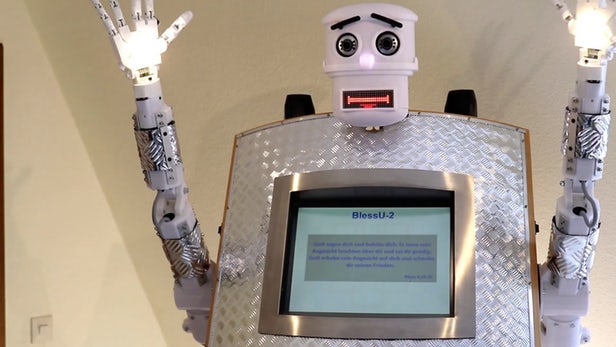You can get blessed by a robot priest. What's not to like?
Robots have been the future for a long time. Now they're the present, and they're making their presence felt in the most unlikely places. A company called Consequential Robotics has developed a bunny-shaped robot designed to care for older people. The MiRo is small and cute, and it responds to voice commands, keeps them company and reminds them to take their pills.
Is nothing sacred? It's a question also raised by BlessU-2, a robot priest developed as part of the Reformation 500 celebrations in Germany. It greets those who approach it and delivers blessings in up to five different languages, in addition to their choice for a male or female voice.

BlessU-2 then offers 31 blessings to choose from its four categories. Once a blessings has been requested, the prayer begins.
'We wanted people to consider if it is possible to be blessed by a machine, or if a human being is needed,' said Stephan Krebs of the Protestant Church in Hesse and Nassau, which developed the robot.
Well, there's a question – and oddly enough, it might have been a familiar one to Martin Luther, in whose home town of Wittenberg BlessU-2 is currently ministering. Because at the root of his Reformation was the conflict between a mechanical – robotic, even – view of salvation that said it was done to you, by specially qualified ministers of the Church, and a deeply personal view that placed the responsibility firmly on the individual. Luther's protest on October 31, 1517, was sparked by the preaching of a friar named Tetzel, a pushy salesman of indulgences. Tetzel sold pieces of paper guaranteeing forgiveness to gullible Christians. So effective were they, he claimed, that they would free from the fires of purgatory someone who had seduced the Virgin Mary and made her pregnant. Armed with one of these indulgences, individuals could sin as much as they liked without fear of any eternal consequences.
This is an entirely mechanical view of forgiveness. Luther's gift to the Church was that he made it personal. Salvation isn't something that's done to you; it's something you choose. We are saved by grace through faith.
However, that's not the only way of looking at it. There's a principle called ex opere operato at work, too. It means that sacraments – like baptism or communion – work independently of the attitude of the minister or the recipient; what matters is that they're done, It's Christ's righteousness that counts, not our own. Anglicans finesse this a bit; the recipient has to be worthy. But the fact that a priest might be a scoundrel doesn't invalidate a baptism or make a communion less of a communion.
And that raises the intriguing possibility that a blessing delivered by a robot might not be such a terrible thing. After all, it's just spoken words, and what's the difference between that and listening to a recording, or reading them on paper? What counts isn't the source of the words – whether a wicked priest or a state-of-the-art robot – but the heart of the believer.
So why, though it might be reasonably defensible theologically, does this feel so unsatisfactory?
Here's a suggestion. I'm not a Catholic or an Anglican and I don't believe a priest's ministrations are any more effective or valid than anyone else's. But I do recognise what happens when, in Cardinal Newman's words, 'heart speaks to heart'. There's something enormously powerful and priestly in an encounter between two people, in which grace is shared.
I saw this powerfully exemplified last night in the new BBC drama Broken, in which Sean Bean plays a damaged priest seeking to minister to equally damaged parishioners. It's a performance that rang absolutely true, and at the heart of it was the humanity of the minister. His prayers and blessings weren't mechanical, but real.
So, BlessU-2? No, thanks. Real ministry is about encounter. It's not a formula, a system or a programme, as some churches seem to imagine: it's heart speaking to heart. And we all know what was wrong with the Tin Man: he didn't have one.
Follow Mark Woods on Twitter: @RevMarkWoods











